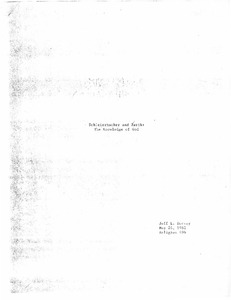| dc.rights.license | In Copyright | en_US |
| dc.creator | Dorsey, Jeff L. | |
| dc.date.accessioned | 2023-10-20T17:40:11Z | |
| dc.date.available | 2023-10-20T17:40:11Z | |
| dc.date.created | 1982 | |
| dc.identifier | WLURG038_Dorsey_thesis_1982 | |
| dc.identifier.uri | https://dspace.wlu.edu/handle/11021/36342 | |
| dc.description.abstract | I will examine the theological work of two writers, Friedrich Schleiermacher and Karl Barth. Friedrich Schleiermacher has been called the "father of liberal Protestant theology" because his thought started theology on a path that saw religion as a historically conditioned symbolic enterprise. He was the first theologian to break with reformation traditions and interpret faith in a new and controversial way. Most Protestant theologians are indebted to his theology. Schleiermacher thinks that revelation is in a deep consciousness within us. Karl Barth, on the other hand, is a twentieth century theologian who sees himself rescuing the Protestant tradition from Schleiermacher and his followers. He wants theology to return to supernatural revelation. We will examine these two writers in detail.
Why did I choose these two theologians? I think that each is the antithesis of the other in their writing. Barth considered Schleiermacher's thought the down fall of Christianity, and Schleiermacher believed thought such as Barth's represented uncritical supernaturalism. This is obviously an oversimplification of their relationship. I intend to demonstrate, however, that these two writers represent totally opposite schools of Protestant thought. I intend to examine Barth and Schleiermacher's work and arrive at some conclusions about their theology and about the knowledge of God. I have chosen Schleiermacher and Barth because I believe them to be good examples of two differing approaches to the question of the knowledge of God. They are so different in their approach that at times they seem to talk past one another with no common ground on which to resolve questions. I will explain Schleiermacher' and Barth's theologies and I will explain how each one thinks we come to know God. I intend to identify the advantages and disadvantages of each one's position. I will also point out which theologian's work I find the most desirable. Finally, I will add some conclusions and show the value of this investigation. [From Introduction] | en_US |
| dc.format.extent | 33 pages | en_US |
| dc.language.iso | en_US | en_US |
| dc.rights | This material is made available for use in research, teaching, and private study, pursuant to U.S. Copyright law. The user assumes full responsibility for any use of the materials, including but not limited to, infringement of copyright and publication rights of reproduced materials. Any materials used should be fully credited with the source. | en_US |
| dc.rights.uri | http://rightsstatements.org/vocab/InC/1.0/ | en_US |
| dc.title | Schleiermacher and Barth: The Knowledge of God | en_US |
| dc.type | Text | en_US |
| dcterms.isPartOf | WLURG038 - Student Papers | en_US |
| dc.rights.holder | Dorsey, Jeff L. | en_US |
| dc.subject.fast | Schleiermacher, Friedrich, 1768-1834 | en_US |
| dc.subject.fast | Barth, Karl, 1886-1968 | en_US |
| dc.subject.fast | Revelation | en_US |
| dc.subject.fast | Protestantism | en_US |
